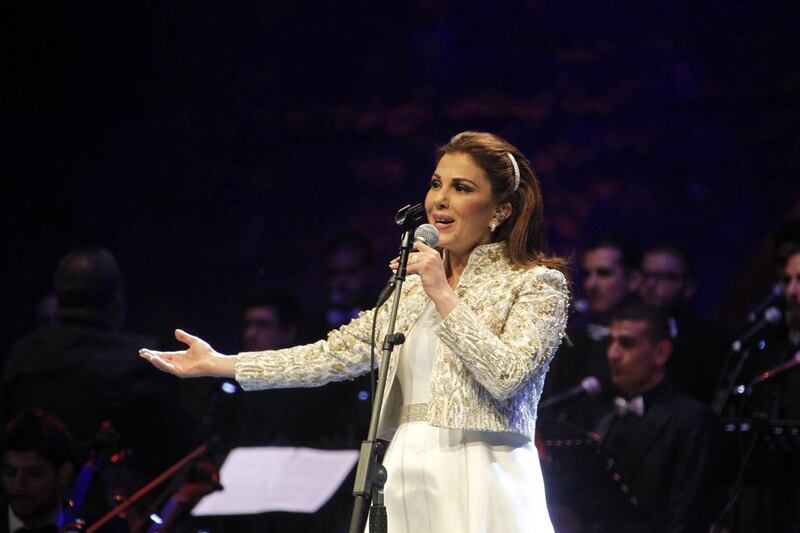Being a professional musician is not only about crafting songs, but knowing when and when not to use them.
This is the message that media and entertainment lawyer Fiona Robertson, from UAE law firm Al Tamimi & Company, wants all regional independent artists to know before stepping inside the recording booth or pressing that upload button on social media.
It is a topic that particularly resonates this month with Lebanese singer Majida El Roumi signalling her intention to pursue a copyright claim against metal band Kimaera for their recorded cover version and accompanying video of her 1995 track Beirut, Set El Donya.
While Robertson cannot comment on any pending legal action, she says the situation underscores the importance of artists being aware of the copyright regulations in their respective country’s jurisdiction.
"It is called the music business for a reason. Infringing on somebody's rights, particularly if you choose the wrong person, is not only going to cost you financially but reputationally," she tells The National.
“You just can't use other people's creative output without their permission. That's what copyright law is there to protect."
While copyright law varies between countries and regions, and can become convoluted between different mediums, Robertson says there are some universal legal fundamentals all artists should know before embarking on their next creative project.
Here are five of them:
1. Know what copyright is
It is imperative for artists to have some understanding or get legal advice on copyright law in the country where they are based or plan to operate in.
But for an immediate and cursory understanding of what copyright is, Robertson says it is all in the name.
“It is about having the right to make a copy,” she states. “The term ‘copy’ is the key word here. If you are performing it live and not making a copy – and ignoring the complexity of the public performance right, which will usually be the responsibility of someone else – then you have nothing to worry about. If you record yourself, then you are making a copy and that is a different ball game.”
2. Seek permission from songwriters
The artist's name may be on the song but when it comes to seeking copyright clearance, you have to read the credits. “The rights to the song itself will belong to the composer or a publisher,” Robertson says. “So you should assume, in this region, that you have to seek their permission before making a commercial copy.”
Robertson stresses the onus is on the artist recording the song to seek that approval. If a situation arises where the songwriters could not be reached and the artist takes the risky decision of recording the song anyway, then they will have to show ample proof to authorities of multiple attempts to connect with the relevant songwriter and publisher.
“Such situations are rare,” she says. “There are ample databases out there that list songwriters and publishers and how to reach them.”

3. What if I am playing live online?
With many music venues shutting their doors as a safety measure amid the pandemic, a host of artists embraced social media for live performances. Is that a risk? Fortunately, Robertson says copyright laws generally allow such practices to take place. “Playing live is fine,” she says. “It is only when you make a copy of that recording and make it available that it becomes problematic and you will be dealing with copyright laws again.”
Robertson says the law becomes more complicated if an artist is working across multiple platforms. If an artist performs live, streams it on social media and then uploads the songs separately on YouTube, for example, it is advised to seek legal advice because they could be dealing with multiple types of copyright across many countries and, therefore, many laws.
4. Interpretation is not originality
Just because you did a reggaeton version of an Umm Kulthum classic doesn’t mean the song now belongs to you.
Robertson says copyright laws generally make no distinction between the original composition and a reinterpretation. No matter how radical it is, it is still the same song.
“You can see this in the classical music world,” she says. “You will get a conductor doing his own spin on a Beethoven piece, but it is still a Beethoven piece. The way the notes are ordered on the page and the way the words are written are still the same. In this region, you should seek permission.”
5. Keep yourself informed
While copyright regulations may require the expertise of lawyers, that doesn’t mean an artist should not be aware of their responsibilities.
Robertson states there is plenty of accessible online literature to help artists educate themselves, such as Songtrust. “They put out masses and masses of free information for musicians about publishing and the industry; it is generally well done,” she says.
As a parting note to artists, Robertson advises taking time to reflect when covering other people’s work. If it feels wrong, then it often is.
“I always encourage artists to look at what they're doing with other people's work and assess how they would feel if the shoe was on the other foot.”







